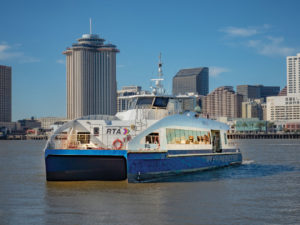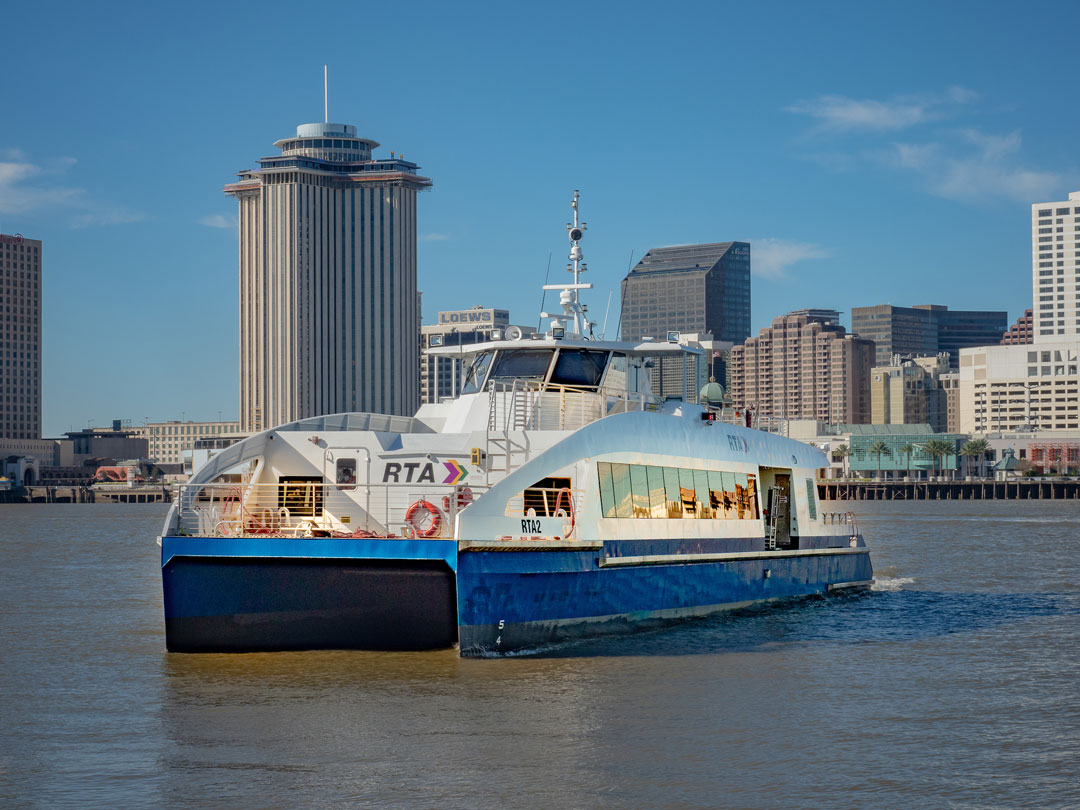A handful of passengers boarded the ferry RTA 2 at the foot of Canal Street in New Orleans on a brisk but bright December day for the crossing to Algiers Point. The riders, masked against the COVID-19 pandemic, represented a tiny fraction of the 150-passenger capacity of the new 105-foot vessel.

The Mississippi River route previously was assigned to the 41-year-old Col. Frank X. Armiger, which frustrated commuters and tourists with unreliable service due to chronic mechanical issues. RTA 1 and RTA 2, moored for over two years while awaiting certificates of inspection from the U.S. Coast Guard, are now in service in New Orleans. Col. Frank X. Armiger will remain in the fleet as a backup vessel.
The certification issues with the new ferries involved the Regional Transit Authority (RTA), the current operator; Metal Shark Boats, the builder; and Transdev, the original operator. The problems have been resolved and the COIs issued.
“RTA 1 and RTA 2 signify the beginning of the next chapter in ferry service and regional transit connectivity in the Greater New Orleans region,” said Alex Wiggins, CEO of the RTA. “As we enter the two new ferry vessels into service, residents, commuters and visitors will experience a more reliable, comfortable, enjoyable and safe transit option, which will help spur local economic development in our neighborhood business districts.”
Daily vessel operations and maintenance are contracted to LabMar Ferry Services, with the RTA providing oversight and direction regarding operations and long-term goals. The RTA also maintains relationships with Coast Guard and Louisiana Department of Transportation and Development to ensure the ferries meet the necessary regulations to maintain service.
The Subchapter T aluminum catamarans, designed by BMT, are powered by twin 715-hp Caterpillar C18 Tier 3 diesel engines. The design incorporates a low-wake, high-efficiency hull for reduced environmental impact.
Initially, the new ferries will operate on an alternating schedule, providing passenger service on the Algiers Point-Canal Street route. The RTA has expressed a commitment to improve regional connections among the parishes, and it is exploring ferry service to other destinations along the Mississippi River corridor — as well as the necessary funding.
The operator has implemented procedures to prevent the spread of COVID-19 aboard the vessels. A midday cleaning has been added to the regular cleaning schedule between sailings. Other protocols require the crew and staff to wear masks, have their temperature checked at the start of each shift, and socially distance as much as possible from other crew and passengers.
Each crew conducts a virtual handover of operations to avoid contact with relief personnel and mariners from other ferries docked at the same facility. The procedures include contactless communication of operational and vessel details between the on-duty and relief crews. If a member of a crew is exposed to the coronavirus, they are required to report it to the agency, get tested and self-isolate. •

